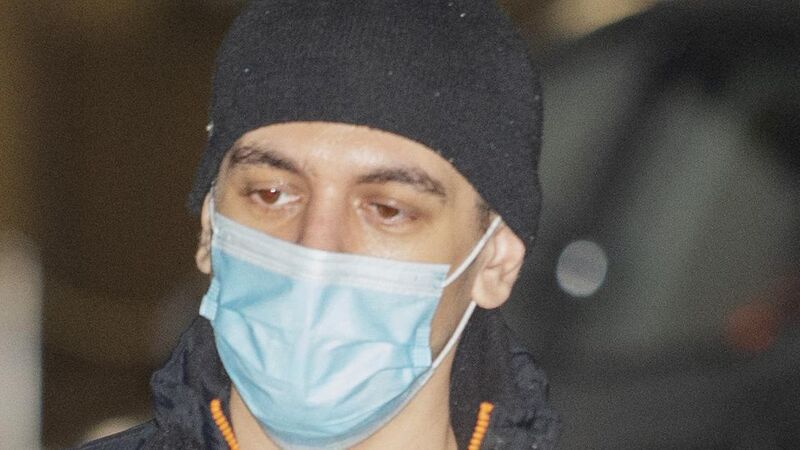Chef had no reason or motive to murder Frankie Dunne, defence tells court

Ionut Cosmin Nicholescu (pictured) will go into his 13th day on March 30 in his trial for the murder of 64-year-old Francis (Frankie) Dunne.
The 30-year-old Romanian chef who denies murdering a 64-year-old Cork man whose decapitated body was found at Christmas 2019 had no reason or motive for the crime and could not be convicted as the prosecution had failed to reach the threshold of beyond reasonable doubt. That was the submission made to the jury in the case in the closing speech by the defence.
The jury is expected to commence deliberations tomorrow once the trial judge ends his address to them.
Defence senior counsel Philipp Rahn referred to the pathologist’s evidence of multiple injuries followed by decapitation and amputation and asked the jury, “Is that something that Mr Ionut Nicholescu was capable of doing and would have done. The connection between them seems non-existent. There is no history and no animosity between them.
“A second fingerprint was found on the bag with the clothes (and who put the print there was never identified). That blows a very large hole in the forensic case by the prosecution.”
Mr Rahn summarised what the accused effectively told the gardaí, “I didn’t know Frankie Dunne.
The defence senior counsel said, “If you accept that, it is not guilty. If you don’t believe that account but do think it could reasonably be true – that it is reasonably possible – then you have to bring a verdict of not guilty.
“But if you don’t believe the account given by the defendant and don’t believe it could reasonably be true that does not allow you to convict. You have to satisfy yourself that the prosecution has established its case beyond reasonable doubt.”
Referring to evidence of pathologist Dr Heidi Okkers, Mr Rahn said, “Injuries show blunt and sharp objects being used. That suggests more than one attacker… It is not impossible they could have been inflicted by one attacker but they could have been inflicted by two.”
He said that a work colleague of the defendant’s at The Silver Key, Tanja Bosnjak, described Nicholescu as very slight and that if one saw him from behind he looked like someone aged 14 or 15.
Mr Rahn commented, “It is highly unlikely someone like that could have caused all those injuries and carried out the decapitation and amputation.”
Mr Rahn pointed to evidence of defensive injuries on the backs of the hands of the deceased.

“I say that is indicative of a violent struggle,” he said and he contrasted this with the evidence put forward by the prosecution from two men walking past the crime scene at around 8.30pm that Friday night hearing one loud noise, variously described as being like a firecracker or glass smashing hard on concrete. He challenged the prosecution view of what could be implied from the two men’s evidence of hearing voices, the loud noise and then silence.
The defence senior counsel did not know how the prosecution was advanced by blood from the deceased being on a roll of plastic bags found in the bathroom of the abandoned house. He said the defendant had explained that he had blood on himself after being compelled by two strangers to move the remains of the deceased and that by his own account he had washed the blood off himself in the bathroom where the roll of bags was found.
"That is important because that appears to be the murder weapon,” Mr Rahn said.
In relation to comments about unusual behaviour of the accused after December 27 2019, Mr Rahn referred to the international murder case where Amanda Knox was convicted of murder and then found not guilty in a retrial. He said much was made of bizarre behaviour by her after the murder when she was seen doing cartwheels, splits and kissing her boyfriend.
As for why Ionat Nicoholescu did not go to the gardaí after the disputed events of December 27, he asked what an Irish person caught up in a situation in a foreign country might do and he suggested they might come home and get a lawyer first. He said that was all that the defendant did in this case.
Mr Rahn said the prosecution had emphasised that with all the CCTV evidence there was no image of the two men described by the accused as being responsible for murdering Frankie Dunne and forcing the defendant to move the remains.
“Look at Mr Nicholescu himself – the lack of any reason or motive. It is unlikely, what the prosecution are saying. There is a very significant forensic problem with the unidentified fingerprint. You have lots and lots of material out of the garda investigation but you cannot be satisfied that there are no relevant questions unanswered. There has to be a reasonable doubt. That threshold of beyond reasonable doubt has not been crossed. The prosecution narrative is not the only one,” Mr Rahn said.
Ionut Cosmin Nicholescu, who had an address at Branistea Village, Damovita County, Romania, will go into his 13th day on March 30 in his trial for the murder of 64-year-old Francis (Frankie) Dunne between Friday December 27 and Saturday December 28 2019, at Castlegreine House, Boreenmanna Road, Cork.
Mr Justice Paul McDermott will complete his address to the jury tomorrow and the eight women and four men will then commence their deliberations at the Central Criminal Court sitting in Cork.







 App?
App?


